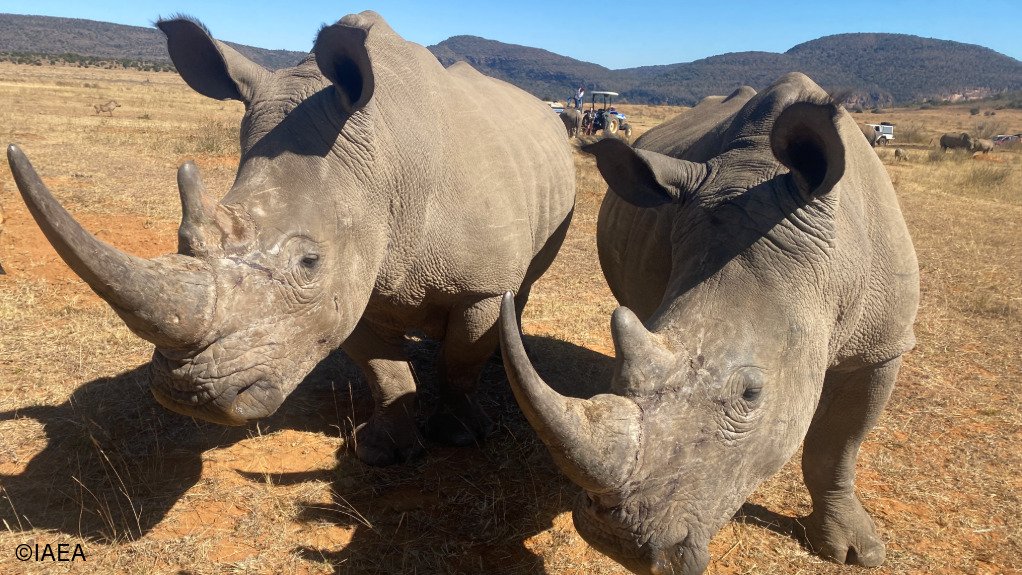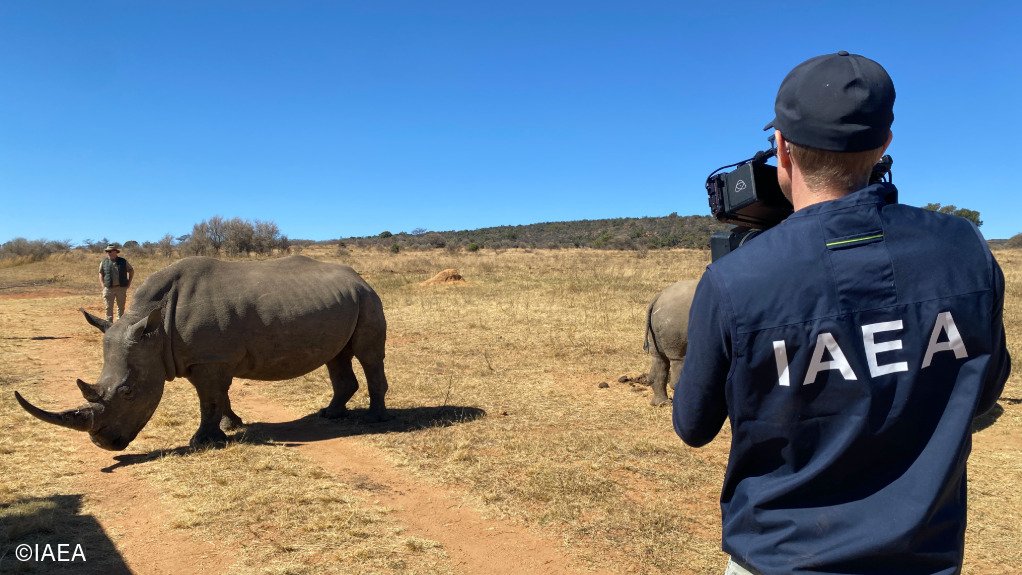IAEA confirms support for Rhisotope project, as pilot phase shows results
The International Atomic Energy Agency (IAEA) has reiterated its support for the Rhisotope project, in South Africa, which entails the insertion of radioactive isotopes into rhino horns and using available nuclear security infrastructure to detect and deter the poaching of these animals.
With over 10 000 rhinos lost to poaching in the past decade, the IAEA says South Africa – home to the world’s largest population of rhinos – remains a target for criminals driven by the illegal trade of rhino horn.
It notes that, in the first quarter of this year alone, 103 rhinos were poached, according to South Africa’s Department of Forestry, Fisheries and the Environment.
In response, the Rhisotope project, run by the University of the Witwatersrand (Wits), is using radiation to support conservation and enforcement efforts. After two years of initial tests, the project was created in 2021 with the idea to tag rhino horns with radioactive material.
This makes the horns detectable by radiation portal monitors (RPMs) that are already deployed at border crossings, ports and airports worldwide.
The RPMs, commonly used to detect nuclear and other radioactive material, can now be harnessed against wildlife crime.
The IAEA says its support to the Rhisotope project leverages its central role in strengthening the global nuclear security framework.
With millions of vehicles and people crossing borders every day, the use of an estimated 10 000 RPMs worldwide has become a critical tool for detecting unauthorised transboundary movements of nuclear and other radioactive material, the IAEA says.
“The Rhisotope project shows how nuclear science and nuclear security infrastructure can be used in new ways to address global challenges.
“The IAEA is supporting countries to maximise the benefits of nuclear. By using already installed nuclear security infrastructure in novel ways, we can help protect one of the world’s most iconic and endangered species,” says IAEA director-general Rafael Mariano Grossi.
At an event on July 31, in the Waterberg, Limpopo, about 250 km north of Johannesburg, Wits announced the results of the rigorous safety assessments conducted during the pilot phase of the project. In June last year, radioisotopes were inserted into 20 rhinos.
Health monitoring and cytological examinations of 15 treated animals and a comparison of five animals not treated were conducted by Ghent University in Belgium.
The IAEA says the test results proved that the method is non-invasive and does not pose a risk to the rhinos’ health.
“This has been an international collaboration of like-minded individuals who are trying to make a real difference to this poaching crisis,” says Wits Radiation and Health Physics Unit director James Larkin.
“We started with the question – what if radiation could protect rather than harm, by turning rhino horns into traceable markers that stop poachers before they trade? After two years of digital modelling, safety testing and detection simulations, we're ready to roll out a solution that could truly reduce rhino poaching,” he says.
The IAEA says the success of the project also opens the door for future applications to other endangered species.
“The methodology could be adapted to protect other endangered species like elephants or pangolins,” Larkin says.
The IAEA says it is providing both technical and financial support to the project under its Coordinated Research Project titled ‘Facilitation of Safe and Secure Trade Using Nuclear Detection Technology – Detection of RN and Other Contraband’.
As part of the project, the agency says it also supports countries in their efforts to optimise the detection of radiation by the use of its Minimum Detectable Quantity and Alarm Threshold Estimation Tool, thereby allowing detection of the tagged-with-radiation rhino horns.
“The Rhisotope project brings the entire global nuclear security network into play.
“The nuclear security infrastructure that exists in many countries around the world to detect smuggling of nuclear and other radioactive material can be used to pick up the trafficking of rhino horn, and any other contraband that might be carried alongside it. Committing to nuclear security pays off in multiple ways,” says IAEA nuclear security division director Elena Buglova.
Article Enquiry
Email Article
Save Article
Feedback
To advertise email advertising@creamermedia.co.za or click here
Comments
Announcements
What's On
Subscribe to improve your user experience...
Option 1 (equivalent of R125 a month):
Receive a weekly copy of Creamer Media's Engineering News & Mining Weekly magazine
(print copy for those in South Africa and e-magazine for those outside of South Africa)
Receive daily email newsletters
Access to full search results
Access archive of magazine back copies
Access to Projects in Progress
Access to ONE Research Report of your choice in PDF format
Option 2 (equivalent of R375 a month):
All benefits from Option 1
PLUS
Access to Creamer Media's Research Channel Africa for ALL Research Reports, in PDF format, on various industrial and mining sectors
including Electricity; Water; Energy Transition; Hydrogen; Roads, Rail and Ports; Coal; Gold; Platinum; Battery Metals; etc.
Already a subscriber?
Forgotten your password?
Receive weekly copy of Creamer Media's Engineering News & Mining Weekly magazine (print copy for those in South Africa and e-magazine for those outside of South Africa)
➕
Recieve daily email newsletters
➕
Access to full search results
➕
Access archive of magazine back copies
➕
Access to Projects in Progress
➕
Access to ONE Research Report of your choice in PDF format
RESEARCH CHANNEL AFRICA
R4500 (equivalent of R375 a month)
SUBSCRIBEAll benefits from Option 1
➕
Access to Creamer Media's Research Channel Africa for ALL Research Reports on various industrial and mining sectors, in PDF format, including on:
Electricity
➕
Water
➕
Energy Transition
➕
Hydrogen
➕
Roads, Rail and Ports
➕
Coal
➕
Gold
➕
Platinum
➕
Battery Metals
➕
etc.
Receive all benefits from Option 1 or Option 2 delivered to numerous people at your company
➕
Multiple User names and Passwords for simultaneous log-ins
➕
Intranet integration access to all in your organisation























